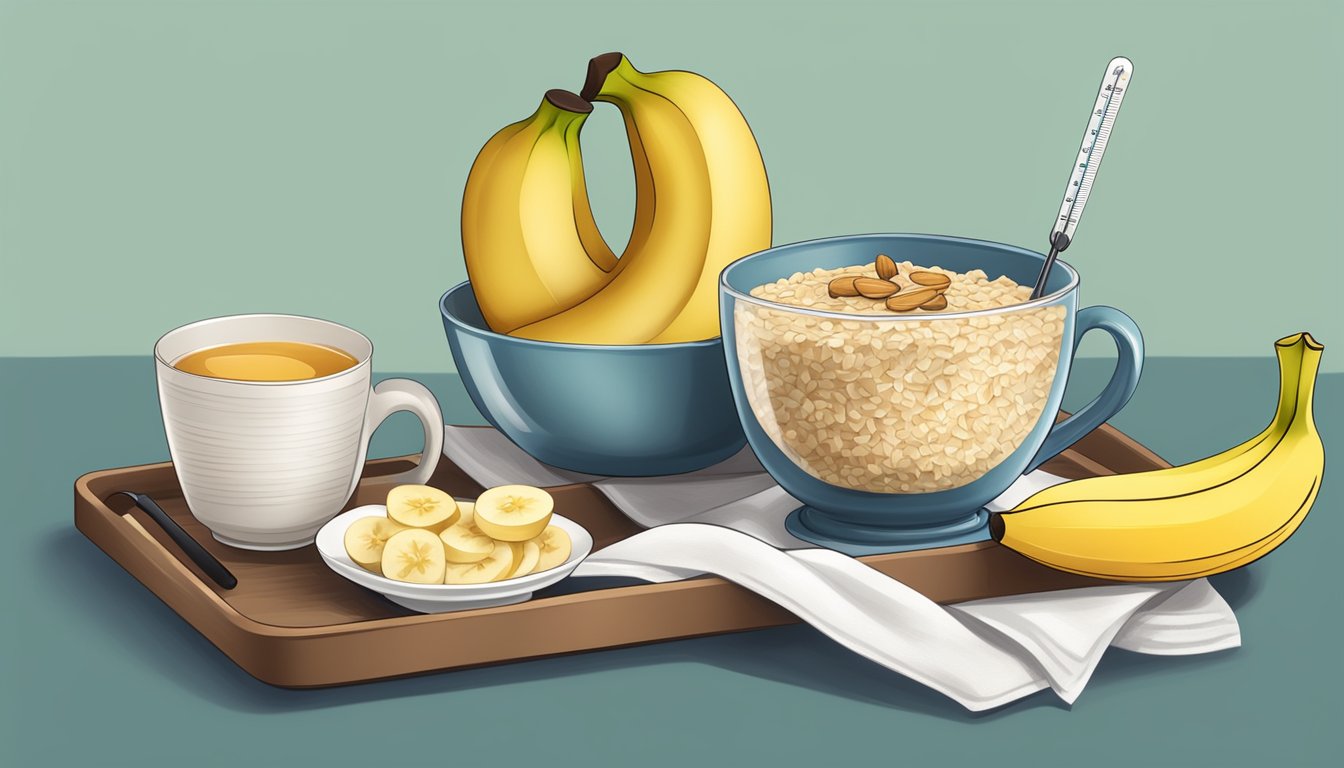When illness strikes, choosing the right breakfast can make a significant difference in recovery and comfort. Nourishing the body with appropriate foods helps support the immune system and provides energy to fight off infections. Opt for easily digestible, nutrient-rich options like whole-grain fortified cereals, oatmeal, or toast with a protein source such as eggs or yogurt.
Eating breakfast when sick is crucial, as it replenishes the body after a night of fasting and provides essential nutrients to combat illness. While appetite may be diminished, consuming even a small amount can help stabilize blood sugar levels and prevent fatigue. The psychological aspect of eating a comforting meal can also contribute to overall well-being during recovery.
Nutrition plays a key role in breakfast choices for the sick. Foods rich in vitamins C and D, zinc, and antioxidants can boost immune function. Hydration is equally important, so incorporating warm beverages like herbal teas or broths alongside solid foods can help maintain fluid balance and soothe sore throats.
Understanding How Food Affects Recovery

Food choices significantly impact the body’s ability to heal and recover from illness. Proper nutrition provides essential building blocks for immune function and tissue repair while supporting overall wellness.
Role of Hydration and Fluid Intake
Staying hydrated is crucial when sick. Fluids help regulate body temperature, transport nutrients, and flush out toxins. Water, herbal teas, and clear broths are excellent choices.
Coconut water and bone broth can replenish electrolytes lost through sweating, diarrhea, or vomiting. These drinks provide minerals like sodium, potassium, and magnesium that maintain fluid balance.
Dehydration can worsen symptoms and slow recovery. Sipping fluids regularly throughout the day helps prevent this. Aim for pale yellow urine as a sign of good hydration.
Impact of Nutrients on Immune Function
Certain nutrients play key roles in supporting immune health. Vitamin C, found in citrus fruits and berries, aids in the production of white blood cells. Vitamin A, present in orange vegetables, helps maintain mucous membranes.
Zinc, found in lean meats and nuts, is essential for immune cell development. Foods rich in antioxidants, like colorful fruits and vegetables, help protect cells from damage.
Protein is vital for repairing tissues and creating antibodies. Good sources include eggs, lean meats, and legumes. Including a variety of nutrient-dense foods in meals supports the body’s defense mechanisms.
Interrelation of Digestion and Sickness
Digestive health is closely linked to overall wellness. During illness, the gastrointestinal system can be sensitive. Choosing easy-to-digest foods reduces strain on the digestive tract.
Probiotics, found in yogurt and fermented foods, support gut health by promoting beneficial bacteria. These microorganisms aid in nutrient absorption and immune function.
Bland, soft foods like bananas, rice, and toast can help settle an upset stomach. Avoiding spicy, fatty, or hard-to-digest foods prevents additional stress on the digestive system.
Ginger and peppermint have natural anti-nausea properties. Incorporating these into teas or meals may help alleviate digestive discomfort associated with illness.
Optimal Foods for a Sick Day Breakfast
When feeling under the weather, selecting the right breakfast foods can support recovery and provide essential nutrients. Focusing on easily digestible options rich in vitamins, minerals, and hydration can help boost the immune system and soothe discomfort.
Boosting Immunity with Fruits and Vegetables
Fruits and vegetables are packed with vitamins, minerals, and antioxidants that support immune function. Berries like blueberries and strawberries contain anthocyanins and vitamin C, which have anti-inflammatory properties. Citrus fruits such as oranges and grapefruits are excellent sources of vitamin C, known for its immune-boosting effects.
Leafy greens like spinach offer a variety of nutrients, including vitamin C, iron, and antioxidants. These can be easily incorporated into smoothies or added to scrambled eggs for a nutrient boost. Bananas provide easily digestible carbohydrates and potassium, which can help replace electrolytes lost during illness.
Consider preparing a fruit salad with a mix of berries, citrus, and banana slices. This colorful combination offers a range of vitamins and antioxidants to support recovery.
The Benefits of Warm Beverages and Soups
Warm liquids can provide comfort and hydration when feeling unwell. Herbal teas, such as ginger or chamomile, can help soothe an upset stomach and provide gentle hydration. Ginger tea, in particular, has anti-inflammatory properties and may help alleviate nausea.
Chicken soup is a classic sick day food for good reason. It provides hydration, easy-to-digest protein, and vegetables. The warm broth can help clear congestion and soothe a sore throat. Vegetable-based soups are also excellent options, offering a variety of nutrients in an easily digestible form.
For a nourishing breakfast, consider a small bowl of chicken or vegetable soup alongside a piece of whole-grain toast. This combination provides hydration, nutrients, and gentle sustenance.
Choosing the Right Carbohydrates
Carbohydrates are an important energy source, even when sick. Opt for easily digestible options that won’t strain the digestive system. Oatmeal is an excellent choice, providing soluble fiber and beta-glucan, which can help boost immune function.
Whole grain toast is another good option, offering fiber and B vitamins. For those experiencing stomach upset, plain white toast may be easier to tolerate. Avoid sugary cereals, which can cause blood sugar spikes and potentially worsen symptoms.
A small serving of oatmeal topped with sliced banana or a piece of whole-grain toast with a thin layer of nut butter can provide sustained energy without overwhelming the digestive system.
Protein-Rich Foods that are Easy on the Stomach
Incorporating protein into a sick day breakfast can help maintain strength and support the immune system. Scrambled eggs are a gentle protein source that’s easy to digest. They can be prepared soft for easier consumption if experiencing a sore throat.
Greek yogurt is another excellent protein option, providing beneficial probiotics that support gut health. For those who can tolerate dairy, it’s a nutritious choice. If dairy isn’t well-tolerated when sick, consider plant-based yogurt alternatives.
Small amounts of nuts or seeds can add protein and healthy fats to breakfast. Chia seeds or ground flaxseed can be sprinkled on oatmeal or added to smoothies for an extra nutrient boost.
Specific Dietary Considerations When Ill

Certain foods and ingredients require special attention when choosing breakfast options during illness. Careful management of dairy, sugar, and caffeine can significantly impact recovery and comfort.
Navigating Dairy and Lactose Content
Dairy products can be beneficial or problematic when sick, depending on individual tolerance. Yogurt, especially Greek yogurt, offers probiotics that support gut health and immune function. However, those with lactose intolerance may experience digestive discomfort.
Opt for lactose-free alternatives if needed. Kefir provides similar benefits to yogurt and is often better tolerated. For those avoiding dairy entirely, plant-based yogurts fortified with probiotics are available.
Consider the consistency of dairy products. Thick Greek yogurt may coat a sore throat, offering relief. Conversely, milk might increase mucus production in some individuals with respiratory illnesses.
How to Manage Sugar and Caffeine Intake
Sugar and caffeine consumption requires careful consideration during illness. Excessive sugar can suppress immune function and potentially prolong recovery time. Choose naturally sweet options like fresh fruits instead of sugary cereals or pastries.
Honey offers a healthier alternative to refined sugar. It possesses antimicrobial properties and can soothe sore throats. Use it sparingly in warm beverages or drizzled over whole-grain toast.
Caffeine can dehydrate the body, potentially exacerbating symptoms. Limit or avoid coffee and caffeinated teas. Opt for herbal teas, which can provide hydration and potential symptom relief. Chamomile tea may aid sleep, while ginger tea can ease nausea.
Energy levels fluctuate during illness. Choose easily digestible, nutrient-dense foods to support recovery without overtaxing the body. Avoid alcohol, as it can interfere with sleep and hydration.
Home Remedies and Natural Supplements

Natural remedies and supplements can provide relief when you’re sick. These options may boost immunity, soothe symptoms, and support recovery.
Utilizing Herbs and Spices for Health
Ginger and garlic are powerful allies against illness. Ginger tea can ease nausea and reduce inflammation. Fresh ginger root steeped in hot water for 10 minutes makes a soothing drink. Garlic contains allicin, a compound with antibacterial properties. Add minced garlic to soups or take garlic supplements.
Turmeric is another potent anti-inflammatory spice. Mix 1/4 teaspoon with warm milk and honey for a comforting “golden milk” drink. Cinnamon may help regulate blood sugar and has antimicrobial effects. Sprinkle it on oatmeal or add to herbal tea.
Echinacea and elderberry are herbs traditionally used to boost immunity. They’re available as teas, tinctures, or capsules. Always follow dosage instructions on supplements.
Effective Natural Solutions for Throat Relief
Honey is a time-tested remedy for sore throats. Its antibacterial properties can fight infection while coating and soothing irritated tissues. Mix 1-2 tablespoons in warm water or herbal tea.
Salt water gargles can reduce swelling and provide temporary relief. Dissolve 1/4 to 1/2 teaspoon of salt in 8 ounces of warm water. Gargle for 10-15 seconds, then spit out.
Marshmallow root tea forms a protective coating on the throat. Steep 1-2 teaspoons of dried root in hot water for 10 minutes. Strain and drink up to 3 times daily.
Slippery elm lozenges or tea can also soothe irritated throats. The herb forms a gel-like substance that coats and protects mucous membranes.
Supplementing with Vitamins and Minerals
Vitamin C supports immune function. Aim for 1,000-2,000 mg daily when sick. Food sources include citrus fruits, berries, and bell peppers.
Zinc may reduce the duration of colds. Take 75-100 mg daily at the first sign of illness. Oysters, beef, and pumpkin seeds are rich in zinc.
Vitamin D plays a crucial role in immune health. Get 15-30 minutes of sunlight daily or consider a supplement of 1,000-2,000 IU per day.
Electrolytes like potassium are essential when you’re ill. Coconut water, bananas, and leafy greens can help replenish these minerals.
Probiotics support gut health and immunity. Look for supplements with multiple strains of beneficial bacteria.
Foods to Avoid While Recovering From Illness

When sick, certain foods can hinder recovery and exacerbate symptoms. Fried and greasy foods should be avoided as they are difficult to digest and may increase inflammation in the body.
Spicy foods can irritate the digestive system and potentially worsen symptoms, especially for those with upset stomachs. It’s best to steer clear of these during illness.
Heavy foods that are hard to digest should be limited. This includes full-fat dairy products, which can be challenging for the body to process when unwell.
The BRAT diet (bananas, rice, applesauce, toast) is often recommended for gastrointestinal issues, but it’s important to note that this diet lacks essential nutrients for recovery.
While some view comfort foods as beneficial when sick, many traditional comfort foods are high in fat or sugar and may not support healing.
Foods that contribute to fatigue, such as those high in refined sugars, should be minimized to help maintain energy levels during recovery.
Surprisingly, even nutritious foods like avocados may be too heavy for some people when ill. It’s crucial to listen to one’s body and opt for easily digestible options.
Caffeinated beverages and alcohol should be avoided as they can lead to dehydration, which is counterproductive when fighting illness.
Putting It All Together: A Guide to Balanced Meals

Creating balanced meals is essential for maintaining good health, especially when feeling under the weather. A balanced diet includes a variety of whole foods from different food groups.
Start by filling half your plate with vegetables and fruits. Berries and bananas are excellent choices, packed with vitamins and antioxidants to support the immune system.
For protein, aim for a quarter of your plate. Options include lean meats, fish, eggs, or plant-based sources like beans and tofu. Protein helps repair tissues and fight infections.
The remaining quarter should consist of whole grains or starchy vegetables. These provide energy and fiber to keep you feeling full and satisfied.
Don’t forget to include healthy fats in small amounts. Avocado, nuts, or olive oil can be added to meals for flavor and nutrition.
Portion control is key. Use smaller plates to help manage serving sizes naturally. This approach ensures you get a mix of nutrients without overeating.
For a quick and easy balanced meal, consider making a smoothie. Blend fruits, leafy greens, yogurt, and a handful of nuts for a nutritious drink that’s easy on the stomach.
Remember to stay hydrated by drinking water throughout the day. Herbal teas can also be soothing when feeling unwell.
By following these guidelines, you can create nourishing meals that support your body’s healing processes and overall health.




